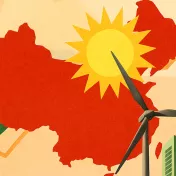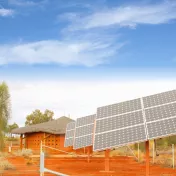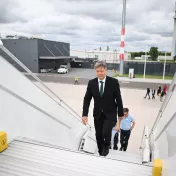EU credibility and attractiveness are at stake in the Western Balkans
When EU and Western Balkan leaders met on May 5th for a virtual EU-Western Balkans summit, the main focus was on the response to the Corona crisis and the EU accession prospects for the countries of the region. However, one topic should not be forgotten: the development of the energy sector in the Western Balkans. Both sides could gain a great deal from Energy Transition Partnerships, especially in order to create positive outlooks for the economy after the Corona crisis.
The EU-Western Balkans Summit will bring together the heads of government of the EU countries and the six Western Balkan states (Albania, Bosnia-Herzegovina, Kosovo, Montenegro, Northern Macedonia, Serbia) as well as the President of the EU Commission and the President of the European Council. A two-day meeting in Zagreb was originally planned as one of the highlights of the Croatian EU Presidency in the first half of 2020. Even if the Corona pandemic has now turned it into a one-afternoon video conference, the Western Balkans is a region of utmost importance to the EU.
Energy Transition Partnerships should be on the summit agenda. Investments in renewable energies and energy efficiency in the Western Balkans offer enormous potential for a strengthening of the economy after the crisis. Through a greater such commitment in the region, the EU would also show that it is serious about its ambition to become a climate pioneer again. The European Green Deal has what it takes to become an identification project for the EU – but then it must also play an active role in relations with the states in its neighbourhood. Relations with neighbouring countries such as those on the Balkan peninsula are an opportunity for the EU to prove that the European project is attractive.
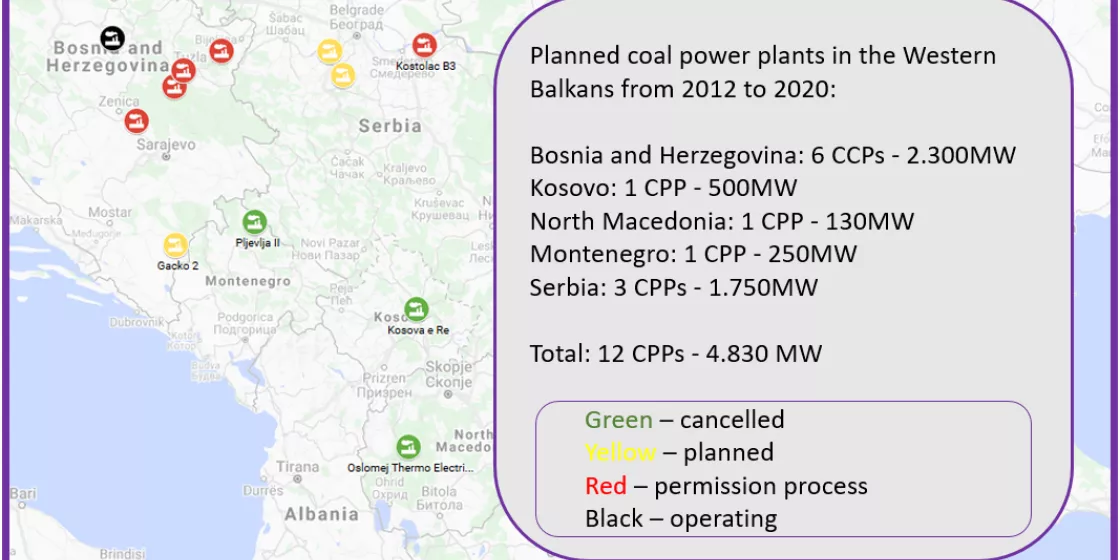
Many actors in the Western Balkans have geostrategic interests and relations between the countries of the Western Balkans are anything but conflict-free. Five of the six countries are, after all, successor states to the former Yugoslavian Republic, which broke up in conflict. Serbia and Bosnia-Herzegovina still do not recognise Kosovo as an independent state. The six Western Balkan countries form a region bordering the EU on all sides: Stability and prosperity in the EU are only possible in the long term if stability and prosperity also prevail in the Western Balkans. For this reason alone it is in the EU's strategic interest that the Western Balkans develop positively and maintain good relations with the EU. But other actors - the USA, Russia, Turkey and China - are also trying to maintain or expand their influence in competition with the EU. In the immediate response to the start of the Corona pandemic, the EU was slow, while medical and protective equipment was quickly delivered to the region from China. This has raised doubts about the EU's reliability, culminating in the Serbian President's statement that China is a closer partner than the EU and that Xi Jinping is a personal friend and brother of the Serbian people. The EU must succeed in being perceived (again) as a credible and reliable partner in the region.
It is therefore a good thing that the EU is using today's summit to make clear how varied and extensive the support for the region is now in terms of dealing with the pandemic, for which over € 3.3 billion have been allocated, and that the Western Balkans still have the prospect of EU accession. In the medium term, it will be crucial that the EU is perceived as the actor in the region to help build a prosperous and sustainable economy and a resilient society. The energy sector is a crucial element to achieve this ambition.
Energy system transformation in the Western Balkans as a joint future project
The energy sector in the Western Balkans is characterised by comparatively poor energy efficiency and a high dependence on lignite-based electricity generation. According to data from the International Energy Agency, 60% of the region's electricity comes from lignite, the most CO2-intensive energy source of all. There are very few plans for new coal-fired power plants on the European continent, but about half of these projects are planned in the Western Balkans.
The energy sector can be a key to achieving common goals between the EU and the Western Balkan countries:
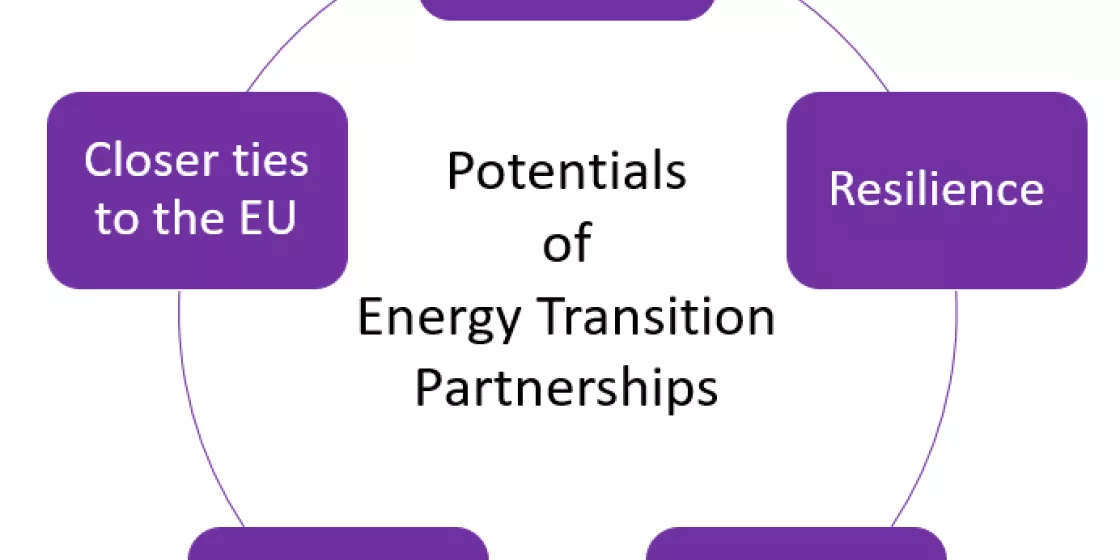
Prosperity: Investments in renewable energies create local added value and future-proof jobs; improvements in energy efficiency also improve the efficiency of the entire economy; investments in future technologies improve the long-term position of the Western Balkan countries' economies. In a study, IRENA estimates that a successful energy transition in South-Eastern Europe could lead to an increase in cumulative economic output of around $485 billion by 2050. In addition, renewables are already today in the countries of the Western Balkans generally the more cost-effective alternative for the provision of electricity or heat. Due to the low energy standards in most countries, investments in energy efficiency also offer a quick return on investment.
Resilience: Modern energy systems with decentralized power generation from renewable energy sources, which are linked together in efficient networks, are more resistant to external shocks. The dependency on fossil fuel imports decreases. Stranded assets (energy infrastructure that must be decommissioned before it is written off) are avoided. Decreasing air pollution improves the health of the population.
Regional integration and conflict prevention: Energy Transition in the Western Balkans will work better if electricity grids are interconnected, cross-border fluctuations in wind/sun availability are balanced and storage capacities are used. This is a concrete incentive for closer cooperation in the region, which can help to prevent conflicts.
Closer ties with the EU: If the EU succeeds in positioning itself as the partner that can provide the Western Balkans with credible and substantial resources to help them move towards a sustainable economy, ties with the EU will grow. Energy system transformation offers many concrete opportunities for closer cooperation between companies, research institutions and governments from the EU and the Western Balkans.
Climate action and coherence: The European Green Deal envisages Europe as the first climate-neutral continent by 2050 and aims to build a circular economy. The proposal would create a new model of prosperity that is socially just and respects the ecological limits of the planet. The European Green Deal must guide the EU in all policy areas, including its ambitions for external relations. Only if it succeeds in bringing other countries along on this path can the European Green Deal have its full impact on achieving global climate and sustainability goals. If it does not succeed, there could even be a threat of new tensions in external relations, for example if a European climate tariff restricts export opportunities for other countries. The first litmus test is whether other countries in the immediate vicinity can succeed in taking other countries with them.
Recommendations for closer cooperation on energy system transformation
The EU is already supporting the Western Balkans - also in the area of better energy efficiency and modern energy infrastructure - with grants and loans worth billions of euros, in addition to comprehensive offers of technical cooperation for capacity building, also from the member states. In addition, through the Energy Community, the EU provides assistance in adapting energy legislation and developing national climate and energy plans (NECPs).The EU should nevertheless further intensify its cooperation with the Western Balkan countries. In doing so, it should focus on the European Green Deal and, in particular, energy system transformation, thus providing a clear, and certainly more conditioned, political framework for support. The following steps are necessary to achieve this:
The billions of euros in aid pledged by the EU in the run-up to the Western Balkans summit to tackle the Corona crisis, amounting to over €3.3 billion, should, where possible, be geared to the objectives of the Green Deal. Half of this money will be provided by the European Investment Bank as concessional loans to support state investment. Here it is important that investments in infrastructure do not flow into fossil fuel projects, but promote energy system transformation.
In addition to short-term financial assistance, today's summit could produce the first agreement between the parties on long-term support measures for reconstruction in the region. The strengthening of existing multilateral financing instruments has already been announced, next to a massive expansion of EU financial guarantees for public and private investment in the region. This financial support must be used to a significant extent for investments in energy efficiency and renewable energy. This would also address the problem of high interest rates on loans for renewable energy projects in the region, which has so far hindered expansion despite the excellent natural conditions for solar and wind energy in some areas.
Lignite and energy-intensive energy sources provide many jobs in most countries in the region. The EU should help to ensure that structural change is carried out in a socially just manner ("Just Transition").
Considerable financial support from the EU should be combined with incentives and sanction mechanisms to enable national legislation and frameworks to regulate, coordinate and finance a strong and rapid expansion of renewable energies.
Four of the six Western Balkan countries are officially candidate countries and all six have committed themselves in the Energy Community to implement key elements of EU energy legislation. Here the EU should work with more vigour to ensure that these requirements – for example to promote renewable energies or to present energy and climate plans – are not only implemented on paper, but in practice. A violation of EU state aid law should lead to more than just conciliation procedures within the Energy Community
In all existing processes of cooperation between the EU and the Western Balkans – the Energy Community, the accession process and the instrument for pre-accession assistance as well as regional investment frameworks, the subsequent EU-Western Balkans Summits and the so-called Berlin Process – special attention should be paid to energy cooperation.
China is very active in the region. Half of China's investment projects in the Western Balkans are in the energy and transport sectors, with investment generally in traditional fossil fuel projects. This is not in line with China's claims to align investments with green criteria in the context of the "new Silk Road". The EU should try to reach an agreement with China on common sustainability principles for foreign investments, e.g. in the Western Balkans. The planned summit of EU and Chinese heads of government in Leipzig in September is an opportunity for this. Regardless of whether such an agreement succeeds or fails, the decisive factor is that the EU makes the more attractive and credible offer for the sustainable economy of tomorrow compared with its geostrategic competitors.
The virtual EU-Western Balkans Summit confirmed that cooperation with the region is high on the EU's agenda and significant support is going to be mobilised in the coming months. This new momentum should also be the starting point for a more serious cooperation with the Western Balkans on the energy transition. The German EU Presidency in the second half of this year should focus on making energy transition partnerships a reality. This is an opportunity that the EU should not miss.




